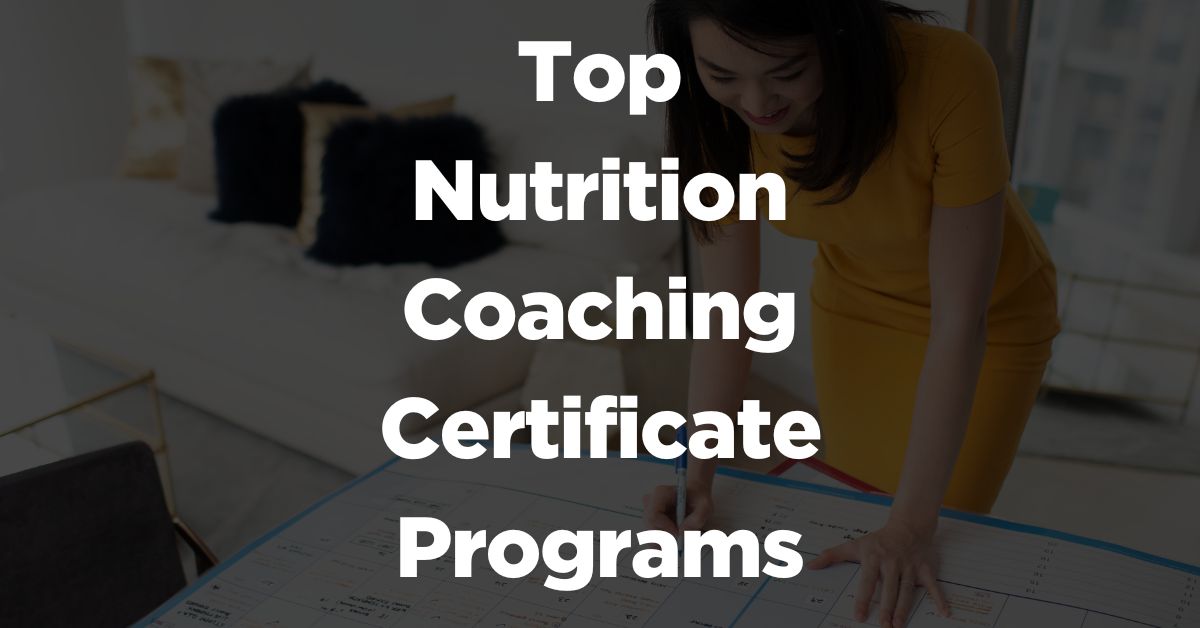What are the best nutrition coaching certifications?
Today, we’ll take a look at the top programs. You’ll also learn whether getting certified is a must for nutrition coaches.
Let’s dive right in!
You’ll learn:
If a nutrition coach needs a degree or a certification
The best nutrition coaching certification programs
How to choose the best nutrition coaching certification
How to know if a nutrition coach certification is worth it
Does a nutrition coach need a degree or a certification?
Do you need a diploma to call yourself a nutrition coach?
Not really.
Coaching is an unregulated industry.
Your value as a coach lies in the transformation you offer your clients. They’re not coming to you for a certificate; they’re coming to you for results.
That said, some coaching niches are stricter so always check your specific industry.
Now, if you want to become a registered dietitian, that’s where the degree comes into play.
In that case, you’d need to graduate from a program that’s got the stamp of approval from the Accreditation Council for Education in Nutrition and Dietetics (ACEND). Think of programs like those at the University of Northern Colorado or Kansas State University.
What’s the difference between accreditation and approval?
- Accreditation is more formal and thorough. It means ACEND confirms that a nutrition program teaches what’s needed to work as a registered nutrition professional. ACEND looks at the program’s content, quality, and how it prepares students for the profession.
- Approval is a little lighter. It says a single course is good enough to count towards the education nutrition professionals need to stay certified. It’s not as in-depth as accreditation, and ACEND does not “approve” programs.
Typically, large organizations will have their comprehensive programs accredited by ACEND. They may also recommend specific courses that they believe offer valuable learning opportunities for continuing education credits.
Get the Ultimate Guide
for building a
6-Figure Coaching Business so you can achieve more freedom!
Some of the big names that do this include:
- The American Council on Exercise (ACE)
- The National Academy of Sports Medicine (NASM)
- The National Board for Health and Wellness Coaching (NBHWC)
- The American College of Sports Medicine (ACSM)
- The National Board for Health and Fitness (NBHF)
So, in short: is it impossible to become a nutritionist without a degree? Definitely not!
It simply means you won’t be able to call yourself a registered nutritionist.
But you can still be a GREAT nutrition coach. (Yes, even without a certification. But more on that in a bit…)
The best nutrition coaching certification programs
What are the best nutrition coaching certification programs?
Here’s a list of the top seven.
Note: I didn’t go through these programs myself, but my recommendations are grounded in their reviews and reputation.
1. Certified Nutrition Coach Certification
National Academy of Sports Medicine (NASM)
The National Academy of Sports Medicine (NASM) offers an in-depth nutrition program. It covers the science behind nutrition and the best ways to help change eating habits.
The program is thorough yet flexible. And it offers a quick and cost-effective way to become a certified nutrition coach.
There’s a lot of focus on crucial areas like:
- Nutrition science
- How to change behavior
- Coaching skills
The program consists of 24 chapters that you can take at your own speed. This makes it perfect for busy people.
Duration: One to three months
Price: $899
Accreditation: No (but approved for Continuing Education Units)
Pros:
- No prerequisites to enroll
- Self-paced online program
- Short duration: you can complete the program in as little as 4 weeks
- Open book final exam
Cons: Less focus on business development.
Who is it for? Perfect for busy people who need flexibility, like working professionals or parents.
2. Level 1 Nutrition Coaching Certification
Precision Nutrition
Precision Nutrition offers a step-by-step certification process with two levels. Level 1 is a foundational level that covers the basics, while Level 2 goes deeper.
The Level 1 course has three main sections that are split into smaller topics. They cover everything from the science of nutrition to the effects of diet on sleep and stress.
The self-paced course has a large focus on business development. For example, the first section is on teaching you how to be a good coach and help clients change their habits.
Depending on your pace, you can finish the program in two to four months.
Duration: Two to four months
Price: $1,428
Accreditation: No (but recognized by the American Council on Education (ACE) for college credits)
Pros:
- Study at your own pace
- More focus on business development
Cons: May be placed on a waitlist depending on demand.
Who is it for? Those who are looking for a crash course in nutrition fundamentals.
3. Nutritionist Certification
ISSA
The International Sports Sciences Association (ISSA) is a recognized provider of fitness and nutrition education. Its courses are accredited by the NCCA.
The term ‘nutritionist’ can be a bit confusing. But at its core, ISSA’s Nutritionist Certification program offers a certificate that’s similar to a nutrition coach qualification.
The course covers:
- Nutrition goals
- Macronutrients and micronutrients
- Dietary guidelines
- Debunking diet myths
- Managing a nutrition coaching business
- And more
The program takes two to six months to finish.
You need a high school diploma and a CPR/AED certificate to enroll.
Duration: Two to six months
Price: $639
Accreditation: NCCA
Pros:
- Self-paced program
- Focus on business development and nutritional science
- Get a free website for your coaching business
- Free nutritionist education boot camp
Cons: The title ‘nutritionist’ can be confusing. Like the other programs in this list, this course does not qualify you to be a dietitian.
Who is it for? Those who want to dive deep into nutrition science.
4. Sport Nutrition Specialist
NCSF
The National Council on Strength & Fitness (NCSF) is a well-known name in sports education.
Its Sport Nutrition Specialist certification covers the following:
- Nutrition for health, fitness, and performance (energy nutrients)
- The essentials to health and performance (non-energy nutrients)
- Supplementation for performance, mass, and weight loss
- Nutritional coaching
You can enroll for just the sports nutrition course or combine it with other programs, like their certified personal trainer course.
The self-paced online format is highly flexible, so you can study whenever you have time. This makes it great for busy people.
Depending on how fast you go through the material, you can finish the course in two to four months.
Duration: Two to four months
Price: $349 to $649
Accreditation: NCCA
Pros:
- Self-paced
- Focus on the link between nutrition and performance
- Can combine two certificates in one program
Cons: Stricter prerequisites (but this can also be a pro for some).
Who is it for? Personal trainers who want to offer nutrition coaching.
5. Health Coaching Training Program
The Institute for Integrative Nutrition (IIN)
The Institute for Integrative Nutrition (IIN) offers a wide-ranging program that teaches about holistic health coaching.
It covers seven categories:
- Physical health
- Nutrition
- Mental and emotional health
- Primary food (like relationships, career, social life, finances, environment, and so on.)
- Spirituality
- Coaching
- Business
As you can see, nutrition is just one of seven topics.
Unlike the other coaching programs on this list, this course is not self-paced. Instead, you’re expected to go over the material every week.
However, it does offer some flexibility. It lets you choose between an accelerated six-month pace or a slower twelve-month one.
IIN’s courses are available in both English and Spanish.
Duration: Either six or twelve months
Price: $5,995
Accreditation: No (But it’s recognized by the National College Credit Recognition Service)
Pros:
- Available in both English and Spanish
- In-depth curriculum
- Accelerated or regular-pace programs available
Cons: Higher cost and requires weekly commitment due to it not being self-paced. Nutrition isn’t the main focus.
Who is it for? People who want to become experts on holistic nutrition and who are very interested in the non-nutrition aspects of health coaching.
Get the Ultimate Guide
for building a
6-Figure Coaching Business so you can achieve more freedom!
6. Nutrition Certification
American Fitness Professionals and Associates (AFPA)
The American Fitness Professionals and Associates (AFPA) offers several nutrition certifications, including:
- Holistic nutritionist
- Nutrition consultant
- Gut health nutrition specialist
- Plant-based nutrition specialist
- Nutrition and wellness consultant
- Weight management specialist
- Sports nutrition certification
Each program teaches you how you can help your clients develop healthy eating habits. You’ll also learn strategic counseling and effective goal setting.
Once you’ve finished the course, AFPA offers several business resources to help you build your own business.
Below, I’ll share the details of one of their most popular programs: the holistic nutritionist certification.
Duration: Six months or less
Price: $1,099
Accreditation: Accredited by the American Association of Drugless Practitioners (AADP)
Pros:
- Self-paced program
- Affordable price
Cons: The course doesn’t have a big focus on how to grow a business, but AFPA does offer many free resources for it. Plus, there’s one ‘business fundamentals’ unit on how to begin your own nutrition business.
Who is it for? Those interested in offering holistic nutrition coaching services.
7. Fitness Nutrition
The American Council on Exercise (ACE)
The American Council on Exercise offers a compact fitness nutrition program. You can finish it in a little over one month.
The program teaches you how to help clients:
- Read nutrition labels
- Manage relapse
- Cook healthy and nutritious meals
You’ll also learn about business development and how to coach clients effectively.
Anyone can enroll in the ACE fitness nutrition program. But to be an official ACE specialist, you need an NCCA-accredited certification or similar professional credential.
The program is short and its self-paced setup lets you learn when it fits your schedule. This makes it ideal if you have a busy life.
Duration: About one month
Price: $379 to $479
Accreditation: No (but approved for continuing education hours)
Pros:
- No prerequisites to enroll
- Competitive price
- Quick curriculum
Cons: Not as big of a focus on nutrition science.
Who is it for? Health and fitness professionals who want a deeper understanding of nutrition.
These are the seven best nutrition coaching certifications.
But how do you choose the one that’s right for you? That’s what we’ll cover next.
How do you choose the best nutrition coaching certification for you?
Choosing the right nutrition coaching certification is a big decision.
Here are six things you want to look out for:
- Quality of education
- Approval and/or accreditation
- Cost
- Coursework
- Flexibility
- Post-certification support
Let’s unpack each one.
Quality of education
Look into what the course teaches. Does it cover all the basics as well as some special topics you’re interested in?
High-quality programs will cover nutrition science, dietary patterns, and the psychological aspects of eating.
They may also delve into upcoming areas like inflammation and gut health.
The following questions will help you evaluate the course’s quality:
- Who is teaching the course and what are their credentials?
- What’s the depth of the course materials?
- Is there a good balance between theoretical knowledge and practical application?
- How up-to-date is the course?
- Has the program been approved and accredited by other organizations?
That last question is the next one on this list.
Approval and/or accreditation
You’ve found a course that looks great. But is it just saying it’s good, or do other people think so too?
More specifically, what do experts say?
That’s where approval and accreditation come in.
As mentioned earlier, there’s an important difference between the two:
- Approval means a program meets basic requirements set by an organization.
- Accreditation is a formal and more rigorous recognition of a program’s quality and effectiveness.
Both approved and accredited programs meet specific standards. But accredited programs provide a more intensive educational experience.
Cost
You don’t necessarily need the most expensive course. But at the same time, cheap courses can lack all the benefits other courses offer.
For example, while expensive courses might have fancy extras, these are not always worth it.
Take in-person networking events, for instance. If you live far away and can’t attend, this ‘extra’ adds no value for you.
Another common ‘extra’ is access to exclusive webinars. But if these are not aligned with your learning needs or schedule, they’re not that useful.
Instead, look for a course that offers relevant benefits that you can use no matter where you are. An example would be a program that helps you gain practical coaching experience.
To figure out how useful a program will be, you also need to know what you’ll learn…
Coursework
Get to know the subjects and skills you’ll gain. Make sure they match what you want to learn.
Does the certification cover nutrition science?
Will it teach you how to build meal plans or handle tricky client questions?
And will you feel better prepared to set up your own coaching business?
As a nutrition coach, you’ll want to learn about things like:
- What foods give energy
- Planning a good diet
- Managing dietary restrictions and allergies
- Talking to clients about changing their eating habits
- Creating personalized nutrition coaching programs
Now, you don’t need a certification to learn this. In fact, many of my students don’t have a coaching certification and still earn six figures or more with their businesses.
That’s because they provide REAL value to their clients by helping them get the results they’re after.
However, if you do want to get certified, then you should spend that time learning relevant things.
So, if your goal is to run your own coaching business, find a course that teaches that too.
Flexibility
You need a course that fits into your life — not the other way around.
Can you log in for evening lessons in your PJs if that’s the only time you’ve got? Or do you need to be in a certain place at a certain time?
If you’re juggling work or family, a flexible schedule is so important.
This flexibility can be the difference between finishing the course or struggling to keep up.
Post-certification support
While flexibility and support are important during the course, a great program will also offer you help once it’s done.
Good programs could:
- Help you put together a coaching program
- Introduce you to other nutrition pros
- Give tips on how to grow your coaching business
- Offer free access to industry conferences and events
The right post-certification support can give you a boost when you’re starting out.
The six factors above should all be weighed up when choosing a certification program.
And when picking a course, I recommend you take your time.
Compare your options and choose one that feels right for you.
This brings us to the next important question: is getting a nutrition coach certification even worth it?
Is a nutrition coach certification worth it?
Is a nutrition coach certification worth it?
Here’s a breakdown that might help you decide.
Benefits of a nutrition coach certification
The best nutrition coach certifications are more than just a piece of paper.
They can expand your knowledge and open doors to new business and career opportunities.
Sometimes, it’s about credibility. For instance, certain employers sometimes only hire certified coaches. Examples are corporate wellness programs or health clinics. Similarly, if you want to be a registered nutritionist or dietitian, then you need formal education.
In all other cases, however, getting certified is NOT a requirement.
And focusing too much on it might actually hold you back.
Let me explain…
Why you don’t need a coaching certification
It’s common to think a certificate will give you an edge over competitors. Or maybe you hope you’ll feel more confident with it.
But here’s the truth:
Being certified is not necessary to build a successful business.
Certification isn’t a must-have to be a nutrition coach. That’s because there’s no law saying you need specific qualifications to start a nutrition coaching business. (Except for the areas where you do, so always make sure you know what the requirements are in your niche).
Get the Ultimate Guide
for building a
6-Figure Coaching Business so you can achieve more freedom!
What matters most is that you help your clients achieve results.
This could include helping clients with:
- Managing weight
- Boosting energy
- Improving digestion
- Building a healthier relationship with food
- Getting better skin and hair
- Sleeping well by eating right
- Supporting mood and thinking clearer with balanced meals
- Handling food allergies with ease
You don’t need a certification to get these results.
What you do need is real-life experience…
Here’s what you can do instead
How do you become a great coach? By coaching!
You learn by doing: how to listen and talk better, create personal diet plans, and motivate clients to change.
It’s about understanding what works in real-life situations.
That’s why I tell my students to start coaching as soon as possible.
Getting certified takes time. You could instead invest that energy into improving your coaching skills.
The important thing is to set out to become a high-value coach from the very beginning.
With high value, I mean that you deliver your clients a transformative experience. That’s what they hire you for, after all.
Being able to deliver this type of transformation takes some practice. But luckily coaching is a skill that can be learned.
Here’s what I recommend my students to do:
Start by working with clients at a lower rate. A three-month coaching package for $1,500 is a good starting point.
Offer:
- Biweekly or monthly one-on-one sessions
- Personalized nutrition plans
- Regular check-ins via email
This hands-on approach makes you stand out. It also lets you improve your coaching offer. By working closely with your clients and, especially early on, overdelivering, you’ll find out what helps them get results and what doesn’t.
More coaching experience and testimonials let you charge more — like $3,000, $5,000, or even higher.
That’s when your price tag really reflects the life-changing impact you have on clients.
In this video, I break the process down for you in simple steps:
Frequently asked questions about nutrition coaching
Let’s answer the four most frequently asked questions about nutrition coaching.
What is the difference between a nutrition coach and a nutritionist?
The main differences between a nutrition coach and a nutritionist are in their training and what they offer.
A nutrition coach focuses on the coaching aspects. Their goal is to help clients make sustainable lifestyle changes. They’re more about practical advice. And they work with clients to set and achieve personal health goals, like losing weight or eating better.
A nutritionist, on the other hand, usually has a more formal education and may have a degree in nutrition science. They’re qualified to offer medical nutrition therapy. Nutritionists also tend to have more knowledge when it comes to medical issues, and they often work in clinical settings.
How much do nutrition certifications cost?
The costs of nutrition certification programs vary widely.
Some charge as little as a few hundred dollars, while more comprehensive programs that include a lot of support can cost between $2,000 and $5,000.
The price depends on the:
- Length of the program
- Materials provided
- Reputation of the institution
Always check what’s included so you know you’re getting your money’s worth.
What are the best nutrition certification programs?
The best nutrition certification program for you depends on your goals and learning style.
There are many different options. But some well-known ones are offered by the National Academy of Sports Medicine (NASM) and the International Sports Sciences Association (ISSA). These programs are respected in the health and fitness industry.
How much do nutrition coaches make?
According to Salary.com, nutrition coaches make $44,300 on average.
While Glassdoor says that nutrition coaches have an average salary of $63,021, with a total range of around $52k – $76k.
Does this mean that you can’t earn more?
Definitely not! Those salary ranges don’t include self-employed nutrition coaches.
And starting your own coaching business can be one of the most fulfilling things you can do.
When you are your own boss, your income depends on you.
Get the Ultimate Guide
for building a
6-Figure Coaching Business so you can achieve more freedom!
It all comes down to:
- The value you offer your clients
- How you market your business
- Who your target audience is
- How you grow your business
Several of my clients, including nutrition coaches and nutritionists, make six or multiple six figures. Think about it: if you sell just a few packages every month, you’ll quickly be able to reach a five-figure monthly income.
Next steps
That’s a wrap on nutrition coaching certifications!
The true worth of your coaching is measured by the transformation you offer your clients.
In most cases, certification is an option, not a necessity.
So, deciding to get certified or not is completely up to you.
This is one of the perks of having your own business — you call the shots and decide what’s best for you!
Are you ready to set up your business and create a life of freedom?
Then grab my blueprint to create a successful six-figure coaching business today.

Want to Build a 6-Figure Coaching Business So You Can Achieve More Freedom?
Get Instant Access To My FREE Ultimate Guide Below!
When you sign up, you’ll also receive regular updates on building a successful online business.
Read more:
How to Start a Coaching Business
The Best Coaching Certification Programs
How to Become a Wellness Coach








